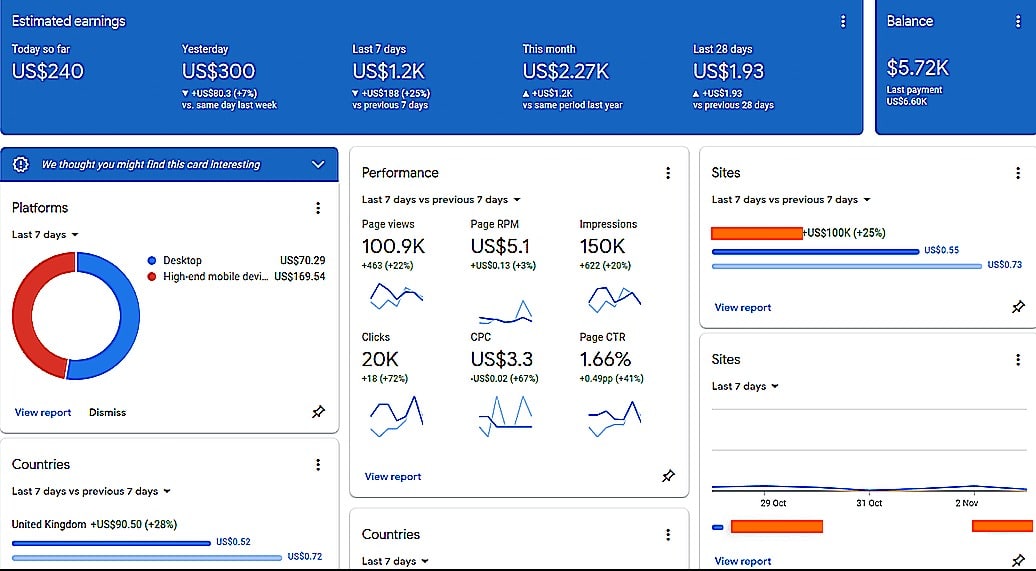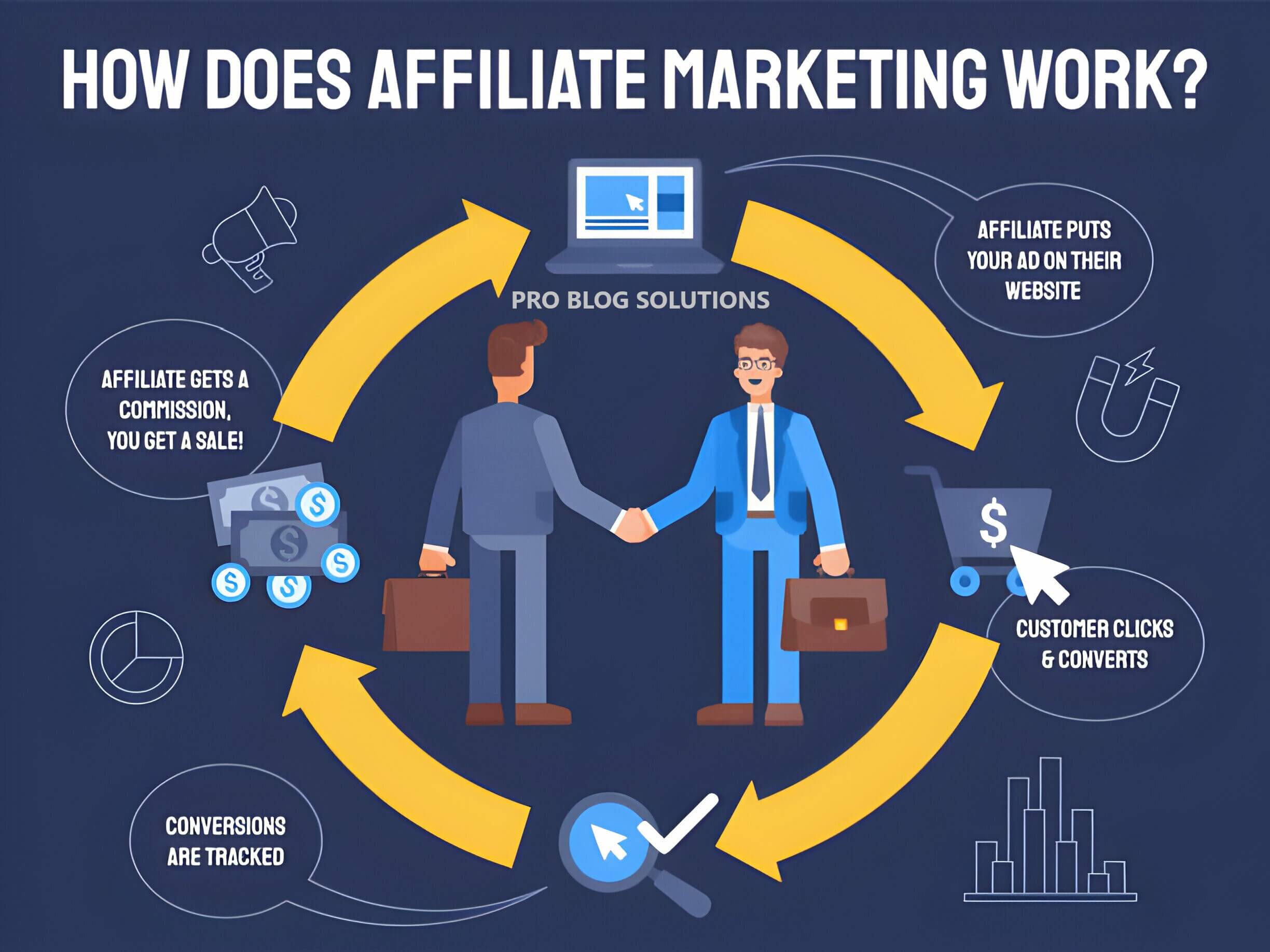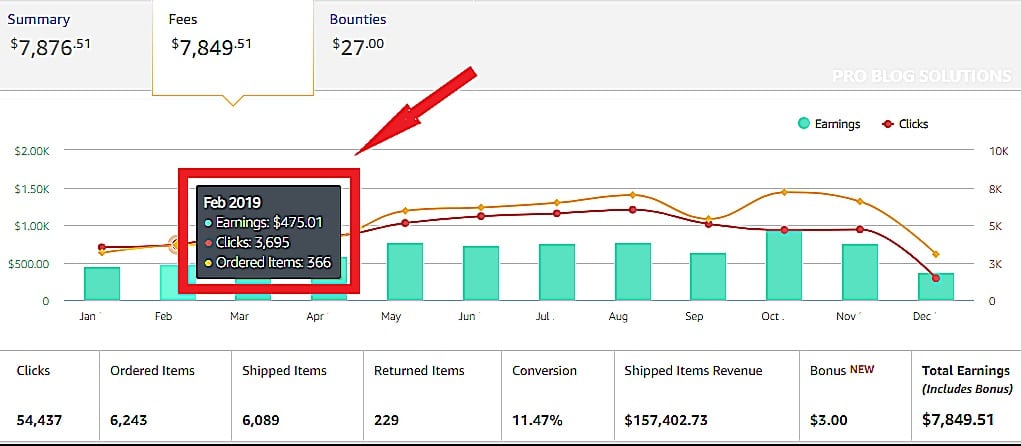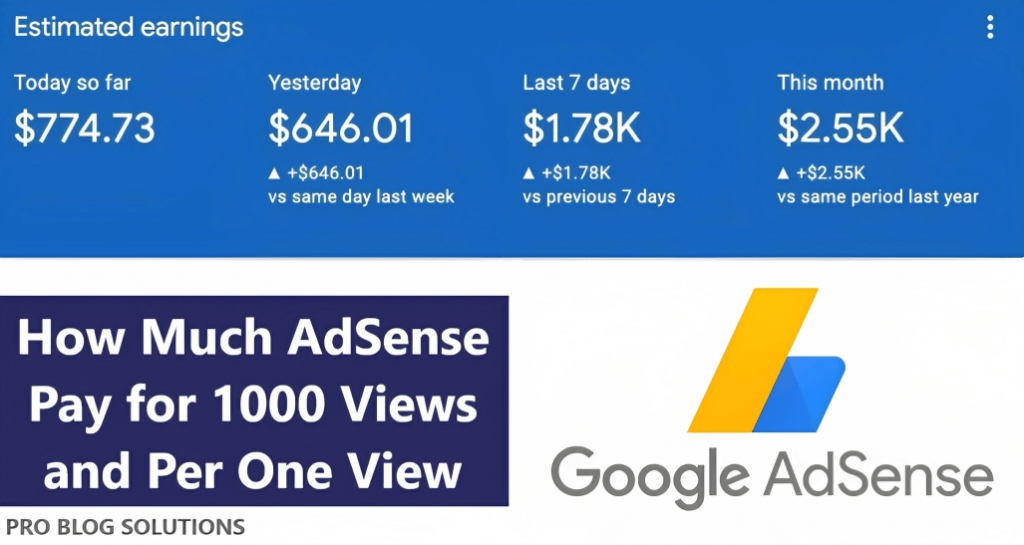Do you have any idea about Google Adsense vs Affiliate Marketing? Which is the best in 2026?
This question must have come to the mind of all bloggers because the primary purpose of all people, whether bloggers or YouTubers, is to earn money, even if they say that I am doing a blog or YouTube only for passion.
If you are starting a new blog, then Google Adsense is the best way to earn money from your blog because, initially, you do not know about affiliate marketing.
Even if you know, you have a lot of trouble understanding the affiliate market. If we talk about affiliate marketing, then it works entirely differently from Google Adsense.
Google Adsense gives you money according to ad clicks; on the other hand, in affiliate marketing, you have to sell products and get money. That is why I will tell you about Google Adsense vs affiliate marketing and which is better for you today.
Before this, I tell about some more questions which are in everyone’s mind, such as,
What is the difference between affiliate marketing and Google AdSense?
Affiliate marketing vs Google AdSense, which earns more?
Can I use AdSense and affiliate marketing together?
Which is better, blogging or affiliate marketing?
Can you make millions with affiliate marketing?
Apart from this, there will be many questions in your mind. I will try my best, and I am sure that after reading this article, Google Adsense vs affiliate marketing, the question will be entirely over in your mind.
Affiliate Marketing or AdSense: Which Makes More Money in 2026?
Both affiliate marketing and AdSense can be effective ways to monetize your website or blog.
Still, the amount of money you can earn will depend on several factors, including the type of content you produce, your audience size, and your niche.
Affiliate marketing is performance-based, meaning you only earn money when someone clicks on your affiliate link and makes a purchase. This can be a very lucrative way to monetize your content, but it can also be more challenging to get started, as you need to build trust with your audience and find relevant products to promote.
AdSense is a display advertising program that pays you based on the number of people who see or click on the ads that are displayed on your website. This can be a less lucrative way to monetize your content, but it is also easier to get started, as you do not need to find and promote specific products.
Here is a table summarizing the key differences between affiliate marketing and AdSense:
| Feature | Affiliate Marketing | AdSense |
|---|---|---|
| Payment model | Performance-based | Click-through rate (CTR) |
| Earnings potential | High | Low to medium |
| Difficulty | Difficult | Easy |
| Control over ads | High | Low |
In simple words, affiliate marketing has the potential to be more lucrative than AdSense, but it is also more challenging to get started and requires more effort to maintain.
AdSense is a good option for beginners who want to monetize their websites or blogs with minimal effort, but it is unlikely to generate much income.
Here are some additional factors to consider when choosing between affiliate marketing and AdSense:
- Your niche: Some niches are more lucrative than others for affiliate marketing. For example, tech and finance tend to be higher-paying niches, while lifestyle and fashion may be lower-paying.
- Your audience size: The more traffic you have, the more money you can earn from affiliate marketing and AdSense.
- Your content: Affiliate marketing works best for product-focused content, while AdSense can work well for a wider variety of content.
- Your time commitment: Affiliate marketing requires more time and effort to set up and maintain than AdSense.
The best way to determine which monetization strategy is right for you is to experiment with both and see what works best for your website or blog.
You may also like to read:
- PPD Sites for Publishers, Best Pay-Per-Download Networks
- Best AI Tools to Boost Productivity with 89x Results
- Digital Marketing Tips to Grow Local Business
- Benefits of Using an Inventory Management System
- Best Chrome Extensions for Productivity
What is Google Adsense, and How it Works?
Google AdSense is an advertising program that helps website owners monetize their content by displaying relevant ads from Google's vast network of advertisers.

It's a free and simple way to earn money from your website traffic without the need to manage or create ads yourself.
How Google AdSense Works?
Google AdSense acts as a middleman between advertisers and website publishers. Advertisers pay Google to display their ads on relevant websites, and Google shares a portion of that revenue with the website owners.
Advertisers Create Ads: Advertisers create text, image, or video ads that they want to promote on Google's network of websites.
AdSense Matching: Google's AdSense program uses a complex algorithm to match ads with relevant websites based on content, keywords, and audience demographics.
Ad Placement: Once an ad is matched with a website, it is displayed in designated ad spaces on the publisher's site.
Payment for Ads: When a website visitor clicks on an ad, the advertiser pays Google a fee. This fee, known as cost-per-click (CPC), generates revenue for both Google and the website owner.
Payment Options and Earning Potential:
AdSense offers two primary payment options:
- CPC (Cost-per-click): You earn revenue based on the number of times visitors click on the ads displayed on your site.
- CPM (Cost-per-mille): You earn revenue based on the number of times ads are displayed on your site, regardless of whether visitors click them. This is typically measured in units of 1,000 impressions (CPM).
The amount you earn through AdSense depends on various factors, including the niche of your website, the quality of your content, the traffic volume, and the competitiveness of the keywords targeted by advertisers.
CPC rates vary widely, ranging from a few cents to several dollars per click. CPM rates are typically lower than CPC rates but can still be a significant source of income for high-traffic websites.
Getting Started with Google AdSense
To start with Google AdSense, you must create an account and sign up for the program. Once approved, you'll receive a unique AdSense code to insert into your website's code to display ads.
Google has specific criteria for approving AdSense accounts, including:
- Website Content: Your website should have high-quality, original content relevant to a specific niche or audience.
- Website Traffic: Your website should have consistent and significant traffic to attract potential advertisers.
- Website Compliance: Your website must comply with Google's AdSense policies, prohibiting illegal or inappropriate content.
Tips for Success with Google AdSense
To maximize your earnings with Google AdSense, consider these tips:
- Create High-Quality Content: Produce engaging and informative content that attracts a loyal audience.
- Choose Relevant Ad Placements: Position ads strategically on your website to maximize visibility without disrupting the user experience.
- Optimize for Ad Networks: Use Google's AdSense auto-ads feature to optimize ad placement and maximize revenue.
- Monitor Ad Performance: Regularly review AdSense reports to track ad performance and identify areas for improvement.
Google AdSense offers a relatively straightforward and accessible way for website owners to generate income from their online content.
By continuously refining your approach, you can monetize your website with Google AdSense and achieve your financial goals.
Benefits of Using Google Adsense in 2026
As we already talked, with Google Adsense, you have to put ads only once; later, you will start getting money according to the click. Google has ads from all over the world, with different banners and links. By using all these, you can earn a lot of money.
There are many benefits to using Google AdSense, including:
- Free to use: AdSense is free to sign up for and use. There are no upfront costs or monthly fees.
- Easy to set up: Setting up AdSense is easy and straightforward. You can add AdSense to your website in just a few minutes.
- Broad reach: Google AdSense has a vast network of advertisers, so you can be sure that your ads will be seen by a large audience.
- Relevant ads: AdSense uses sophisticated algorithms to match ads to your website's content and audience. This ensures that your visitors will see ads relevant to their interests.
- Multiple ad formats: AdSense offers a variety of ad formats, so you can choose the ones that best fit your website's layout and style.
- Flexible payment options: AdSense offers a variety of payment options, so you can choose the one that best suits your needs.
- Detailed reporting: AdSense provides detailed reporting so you can track your earnings and see which ads are performing best.
Examples of how Google AdSense is used
Google AdSense is used by many websites, from prominent blogs to small personal websites. Here are a few examples of how Google AdSense is used:
- A blog about travel: A travel blogger could use AdSense to display ads for hotels, airlines, and other travel-related products and services.
- A website about cooking: A cooking website could use AdSense to display ads for cooking ingredients, appliances, and cookbooks.
- A news website: A news website could use AdSense to display ads for news about current events, business, and technology.
Here are a few tips for using Google AdSense effectively:
- Create high-quality content: The quality of your content is one of the most critical factors in determining how much money you will earn from AdSense. Make sure that your content is well-written, informative, and engaging.
- Choose the correct ad formats: Experiment with different formats to see which ones perform best on your website.
- Place ads strategically: Place your ads in an eye-catching but not intrusive way.
- Track your results: Use AdSense's reporting tools to track your earnings and see which ads perform best.
But still, we will have a question: how much does AdSense pay per 1000 views, or how much can we earn from Google Adsense?
See, there is no fixed rate because, as we discussed, Google Adsense works according to CPC. It depends on which topic you are writing a blog on and what keywords you have used.
If you have good traffic from tier 1 countries and have worked on keywords with high CPC, you can easily earn 200 – 800 dollars per month.
Disadvantages of Using Google Adsense
See, all the products have their advantages and disadvantages too. While AdSense can be a great way to generate revenue, knowing the potential disadvantages is essential before signing up.
1. Limited Control Over Ad Content
AdSense publishers have limited control over the ads appearing on their websites. Google's algorithm determines which ads are displayed based on various factors, including user demographics, browsing behavior, and the website's content.
This can sometimes result in ads irrelevant to the website's audience or even offensive, negatively impacting the user experience.
2. Low Payment Threshold
Google AdSense has a high payment threshold, meaning publishers must earn at least $100 before receiving their earnings. This can be a significant drawback for new publishers or those with low-traffic websites.
For smaller publishers, reaching the $100 threshold can take months or even years, making it difficult to rely on AdSense as a primary source of income.
3. Risk of Click Fraud
AdSense publishers are at risk of click fraud, which occurs when someone intentionally clicks on ads without genuine interest in the advertised product or service.
Click fraud can significantly inflate an advertiser's costs and lead to AdSense publishers being penalized or even banned from the program.
4. Strict AdSense Policies
Google AdSense has strict policies that publishers must adhere to. These policies cover various topics, including ad placement, content restrictions, and user interactions.
Violating these policies can result in account suspension or termination, severely impacting a publisher's revenue.
5. Limited Ad Selection
Google AdSense offers a limited selection of ad types, which can restrict publishers' ability to optimize their ad placements and maximize their earnings.
For example, AdSense doesn't offer push notifications or pop-under ads, two popular ad formats that can effectively generate revenue.
6. Dependence on Google's Ad Network
AdSense publishers depend entirely on Google's ad network, meaning their earnings can fluctuate significantly based on changes in Google's algorithms, advertiser spending, or overall market conditions.
This lack of control can make it difficult for publishers to plan their finances and rely on AdSense as a stable source of income.
Examples of Google Adsense Disadvantages in Practice:
- A blogger who writes about gardening might find that their website displays ads for lawnmowers, fertilizers, and other gardening products. However, if their audience is primarily interested in organic gardening methods, these ads may be irrelevant and even turn readers away.
- A news website might struggle to reach the $100 payment threshold if they don't have a large readership or if its traffic is primarily from social media referrals. This could make it difficult to justify the time and effort required to maintain their AdSense account.
- A YouTuber who creates videos about video games might be concerned about click fraud if their videos are frequently targeted by bots or malicious users. This could inflate their view count and ad revenue, but it could also lead to penalties from Google AdSense.
- A website owner violating Google AdSense policies, such as placing ads in inappropriate locations or displaying misleading content, could have their account suspended or terminated. This would result in a loss of ad revenue and could also damage the website's reputation.
- An e-commerce website might not benefit from AdSense's limited ad selection if they are primarily interested in promoting its own products or services. A more specialized ad network might be a better option in this case.
- A publisher who relies heavily on AdSense as their primary source of income could be vulnerable to changes in Google's ad network. If Google decides to change its algorithms or reduce advertiser spending, the publisher's earnings could plummet.
Google AdSense can be a valuable network for website owners who want to monetize their content. However, it's essential to know the potential disadvantages before signing up.
How Affiliate Marketing Works?

Affiliate marketing is a performance-based marketing strategy where an affiliate earns a commission for every sale they generate for a merchant. The affiliate promotes the merchant's products or services on their website, blog, or social media channels.
When a customer clicks on the affiliate's link and makes a purchase, the affiliate earns a commission.
The affiliate marketing process can be broken down into 5 steps:
The merchant creates an affiliate program. The merchant sets up an affiliate program and chooses which products or services they want to promote. They also determine the commission rate that they will pay to affiliates.
The affiliate joins the merchant's affiliate program. The affiliate signs up for the merchant's affiliate program and receives a unique affiliate link. They can then promote the merchant's products or services to their audience.
The customer clicks on the affiliate's link. The customer clicks on the affiliate's link and is taken to the merchant's website.
The customer makes a purchase. The customer makes a purchase on the merchant's website.
The affiliate earns a commission. The merchant tracks the sale and pays the affiliate a commission.
There are two main types of affiliate links:
- Text links: These are text links containing the affiliate's ID. For example, a text link might look like this: “Click here to buy this product.”
- Banner ads: It means the images or graphics that contain the affiliate's ID. Banner ads are often used on websites and blogs.
How to Earn Money with Affiliate Marketing?
There are many ways to earn money with affiliate marketing. Here are a few examples:
- Create a website or blog. If you have a website or a blog, you can advertise and recommend affiliate products to your audience.
- Write product reviews. You can monetize your website or blog by writing product reviews and using affiliate links.
- Create social media posts. One way to make money through social media is by promoting affiliate products and creating posts about them.
- Create email marketing campaigns. Email marketing campaigns can be created to promote affiliate products.
- Create videos. Have you considered creating videos to promote affiliate products?
Affiliate marketing is a powerful tool to generate revenue for merchants and affiliates. However, it is essential to note that affiliate marketing is not a get-rich-quick scheme. It takes time and effort to build a successful affiliate marketing business.
There are many examples of successful affiliate marketers. Here are a few:
- Pat Flynn: Pat Flynn is a blogger and affiliate marketer earning over $7 million annually from affiliate marketing.
- Michelle Schroeder-Gardner: Michelle Schroeder-Gardner is a blogger and affiliate marketer who earns over $1 million annually from affiliate marketing.
- Matthew Wood: Matthew Wood is an affiliate marketer who earns over $100,000 per month from affiliate marketing.
Benefits of Using Affiliate Marketing
The success of affiliate marketing can be attributed to its performance-based nature, alignment of interests between businesses and affiliates, and ability to reach targeted audiences.

It has become integral to digital marketing, driving sales, boosting brand awareness, and generating passive income for many businesses and individuals.
1. Flexible Income Opportunity
Affiliate marketing offers a flexible and potentially lucrative income stream. Affiliates can work from anywhere and set their own hours, making it an attractive option for individuals seeking supplemental income or a full-time career.
2. Low Start-Up Costs
Affiliate marketing requires minimal upfront investment, making it accessible to individuals with varying financial resources. Most affiliate programs are free to join; a website or blog, social media presence, or other online platform is needed.
3. Choose Products to Promote
Affiliates can choose products or services that align with their interests, expertise, and target audience. This ensures they promote products they genuinely believe in, leading to more authentic and effective marketing.
4. Passive Income Potential
Affiliate marketing can generate passive income, meaning that affiliates continue to earn commissions even when they are not actively promoting products. This is achieved through evergreen content and strategic marketing strategies.
5. Performance-Based Rewards
Affiliates are rewarded based on their performance, directly linking their efforts to their earnings. This motivates them to invest time and energy into promoting products effectively.
6. Networking Opportunities
Affiliate marketing provides opportunities to connect with other affiliates, businesses, and industry experts. This can lead to valuable collaborations, knowledge sharing, and industry growth.
Disadvantages of Affiliate Marketing
While affiliate marketing offers several benefits, it also encompasses certain drawbacks that aspiring affiliates and businesses should be aware of.
1. Unpredictable Income and Reliance on Performance
One of the primary disadvantages of affiliate marketing is the unpredictable nature of income. Unlike traditional employment, where a fixed salary is guaranteed, affiliate earnings depend solely on performance.
This means that affiliates may experience fluctuations in income, with periods of high earnings followed by periods of lower revenue. This unpredictability can make it challenging to plan finances and maintain financial stability.
2. Dependence on External Factors and Platform Rules
Affiliate marketers often rely on external factors beyond their control, such as the quality of the products or services they promote, the effectiveness of the merchant's website or sales funnel, and the overall market conditions.
These factors can significantly impact conversion rates and, consequently, affiliate earnings. Additionally, affiliate marketers are subject to the rules and policies of their platforms, which may change over time and negatively affect their earning potential.
3. High Competition and Saturation in Certain Niches
Affiliate marketing has become increasingly popular, resulting in a highly competitive landscape. In many niches, there is an overabundance of affiliates vying for the attention of the same target audience.
This intense competition makes it difficult for new affiliates to stand out and attract a significant market share. Even established affiliates may struggle to maintain earnings as more competitors enter the field.
4. Potential for Misrepresentation and Product Quality Concerns
Affiliate marketers have a responsibility to promote products or services honestly and accurately. However, there are instances where affiliates may misrepresent products or exaggerate their benefits to drive sales.
This can lead to customer dissatisfaction and damage the reputation of the affiliate and the merchant. Additionally, affiliate marketers may promote products of varying quality, which could reflect poorly on their judgment and affect their credibility.
5. Building Trust and Establishing a Loyal Audience
Affiliate marketing requires building trust with the audience and establishing a loyal following. This takes time, effort, and consistent high-quality content creation.
Without a dedicated audience, affiliates may struggle to generate significant traffic and conversions.
Additionally, once a customer purchases through an affiliate link, there is no guarantee that they will continue to make future purchases through the same affiliate.
This makes it challenging to build a sustainable and recurring revenue stream.
To illustrate the challenges faced by affiliate marketers, consider the following examples:
- A fitness affiliate's income fluctuates significantly depending on the popularity of fitness trends and the effectiveness of their promotional campaigns.
- An affiliate promoting a new tech gadget experiences a drop in earnings due to negative reviews and product issues.
- A fashion affiliate faces intense competition from other affiliates in the same niche, making it difficult to attract a substantial audience.
- A travel blogger encounters instances where readers feel misled by the affiliate's overly enthusiastic product reviews.
- An affiliate marketing website experiences a decline in traffic and conversions due to algorithm changes on a social media platform.
Affiliate marketing, while offering promising opportunities for earning an income, has its challenges. Understanding the potential drawbacks and carefully considering the effort and skills required is crucial before embarking on an affiliate marketing journey.
Conducting thorough research, choosing reputable merchants and products, and consistently producing high-quality content that resonates with the target audience is essential as an affiliate.
Things to know: Google Adsense vs Affiliate Marketing in 2026
1: Anyone can join affiliate marketing; its approval is readily available, whereas it is tough to get approval from Google Adsense, and sometimes it takes 1 to 3 months to approve.
2: In affiliate marketing, you can earn more in less traffic than Adsense. You just have to learn how affiliate marketing works.
3: Adsense payment comes directly to your bank account or Western Union, whereas most affiliate marketing company pays through Paypal.
4: If your account is disabled in Adsense, then not a single dollar in your account is given to you, whereas in affiliate marketing, the account is not disabled, and even if it is disabled, it gives you your money.
5: You will get an affiliate program for all niches, whereas Adsense does not approve all types of blogs.
6: In Adsense, complete control of your earnings remains with Google only, whereas in affiliate marketing, you have complete control.
7: In affiliate marketing, you can promote the product according to your wish, whereas in Adsense, ads are given according to Google’s wish; if you tamper with it, your account will be banned.
8: All the ads of Adsense are not so attractive that people click on them, whereas all the ads of affiliate marketing are attractive, due to which your conversion rate becomes high.
9: If a user clicks on your ads in Google Adsense more often, your account gets disabled, whereas there is no such danger in affiliate marketing.
10: To earn more from Google Adsense, you should have more organic traffic, whereas you can do affiliate marketing with any traffic.
Recommended for you:
- Best Pay-Per-Download Networks (PPD Sites)
- Make Money With Google: 16 Practical Methods
- Is UserTesting Legit or Scam? UserTesting Review
- Fused Hosting Review With Expert Opinions
- Best Blogging Tools You Need to Be Successful
Can You Use AdSense and Affiliate Marketing Together in 2026?
You can use AdSense and affiliate marketing together on the same website. This can be a great way to maximize your earnings, as you can potentially generate income from both clicks on AdSense ads and sales made through your affiliate links.
However, using both methods strategically is essential to avoid overwhelming your visitors with ads and creating a negative user experience.
Benefits of Using AdSense and Affiliate Marketing Together:
- Increased Revenue Potential: Combining AdSense and affiliate marketing can significantly boost your overall website earnings.
- Diversified Revenue Streams: Relying on multiple monetization methods reduces your dependence on a single source of income.
- Broader Reach: AdSense and affiliate marketing can attract different audiences, expanding your potential customer base.
Strategies for Using AdSense and Affiliate Marketing Together:
- Balance Ad Placement: Avoid cluttering your website with ads. Place them strategically to complement your content without disrupting the user experience.
- Choose Relevant Affiliate Products: Promote products or services that align with your website's niche and audience interests.
- Disclose Affiliate Relationships: Clearly disclose your affiliate relationships to comply with FTC guidelines and maintain transparency.
- Track Performance: Regularly monitor the performance of both AdSense ads and affiliate links to optimize your monetization strategy.
Examples of Successful AdSense and Affiliate Marketing Combinations:
- Tech Review Websites: Combine AdSense with affiliate links to tech products and software.
- Fashion Blogs: Use AdSense alongside affiliate links to fashion apparel and accessories.
- Travel Blogs: Combine AdSense with affiliate links to travel accommodations and booking services.
Additional Success Tips for You:
- Create High-Quality Content: Engage your audience with valuable, informative, and well-written content to attract and retain visitors.
- Build a Strong Online Presence: Promote your website through social media, email marketing, and other online channels.
- Prioritize User Experience: Ensure your website provides a positive user experience with straightforward navigation, fast loading times, and a clutter-free design.
- Stay Updated with Policies: Keep up with the latest AdSense and affiliate program policies to avoid compliance issues.
AdSense and affiliate marketing, when used strategically, can be powerful tools for monetizing your website.
By balancing ad placement, choosing relevant products, and disclosing affiliate relationships, you can maximize your earnings while maintaining a positive user experience.
With a well-crafted approach, you can leverage AdSense's and affiliate marketing's strengths to achieve your website monetization goals.
Final Words on Google AdSense vs Affiliate Marketing and What is Best in 2026?
Prominent bloggers nowadays earn more money than Google Adsense with affiliate marketing. If I talk about myself, I also trust more on affiliate marketing more, although some of my blogs are also dependent only on Adsense.
So, I believe both platforms are good in their respective places, as we mentioned above about Google Adsense vs affiliate marketing details.
But if you have come up with affiliate marketing, you should do Affiliate Marketing only because you can earn a lot of money with less effort. I hope you understand what is better between Google Adsense and Affiliate marketing.
That’s all in today’s article, and articles related to affiliate marketing, blogging, and online earning will continue to come on our blog in the future, too. If you liked the article, share it with your friends and on social media, and if you have any suggestions for us, please comment below.
Pro-tip on affiliate marketing vs. AdSense:
If you are just starting out, create good content and attract more traffic from Google. Apply for AdSense and start using it to make the first few dollars. Once you are making a decent income from AdSense, start building an email list and introduce affiliate products to your audience. Slowly go from using AdSense to affiliate marketing, and you will be making a reliable income from your sites.






